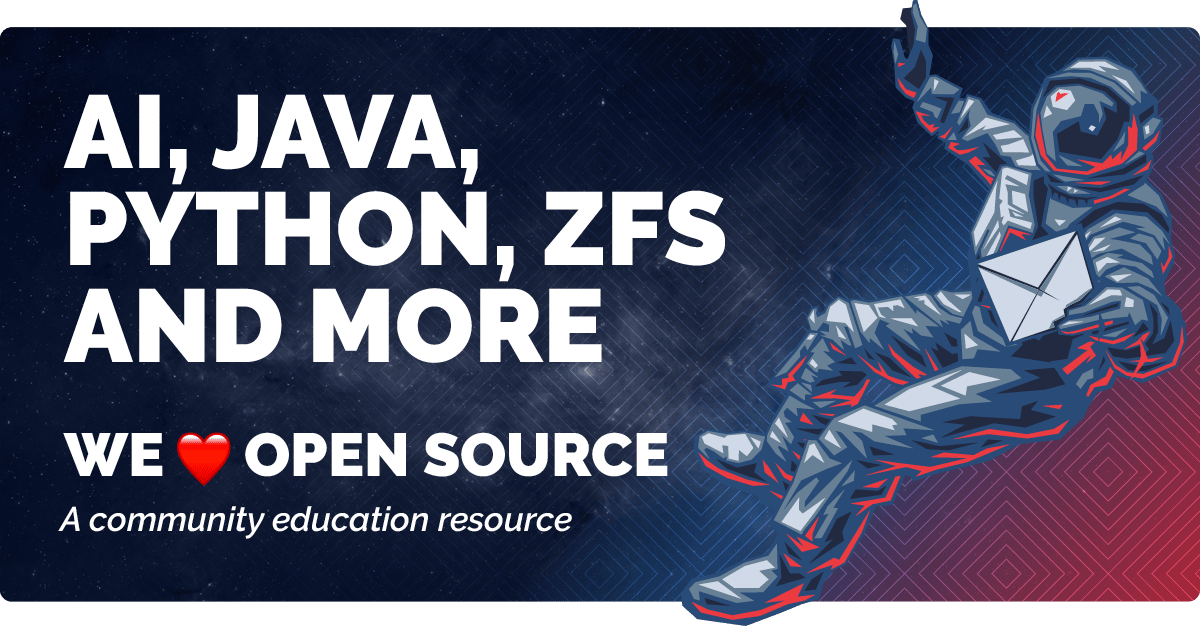- We ❤️ Open Source
- Posts
- The price of not opening this? AI, Java, Python, ZFS and more
The price of not opening this? AI, Java, Python, ZFS and more

Welcome to edition #13 of the We ❤️ Open Source newsletter!
Our goal is simple - to increase your open source IQ and introduce you to the people making open source possible by way of original content created and curated by humans. 🙂
This week we'll look at…
5 things to consider when choosing a Java application server
How attackers manipulate AI models: Practical lessons in AI security
Breaking barriers with Python: Naomi Ceder’s journey of identity, leadership, and community
Building your data plumbing: Lessons from a backyard drainage project
Capture and annotate Linux screenshots fast with KDE Spectacle
From ZFS to command-line tools: Build systems that just work with Jim Salter
From code to prompts: A developers shift to AI-powered workflows with David He
Let's get into it!
Do you love events as much as we do?
If so, you'll LOVE the Vector Search Conference coming up on June 6. It's a free one-day virtual event dedicated to the latest innovations and trends in vector search technology.
As the first conference bringing together the global vector search community, it unites researchers, engineers, and industry leaders to explore cutting-edge advancements, best practices, and real-world applications in similarity search, retrieval-augmented generation (RAG), and AI-powered search solutions.
Lee Faus, Global Field CTO at GitLab, examines 3 trends shaping software development in 2025, all of which are AI related and look beyond code generation. WHY WE ❤️ IT: According to GitLab research, 78% of organizations either actively use AI in their development processes or plan to implement it in the next two years. Understanding the impact of AI beyond just the code is essential. |
Chiara Civardi takes a look at 5 key elements when identifying the right middleware technology for your Java applications in this really interesting article. WHY WE ❤️ IT: Middleware, the layer between your application and the operating system, plays the same vital role in software as yeast does in baking. It's a fascinating comparison. |
In his “Hacking AI – How to survive the AI uprising” talk at ATOAI earlier this year, Gant Laborde explored how attackers manipulate AI models through techniques like adversarial image perturbation, data poisoning, and model inversion. This article is a jam-packed summary of that talk. WHY WE ❤️ IT: Gant's talk already has more than 1,100 views on our YouTube channel - it's wildly entertaining and informative. Our community can learn how to defend AI models from adversarial inputs, data poisoning, and other security threats and a bunch of other things by reading and watching. |
In this wonderful She Lights the Way collaboration post Naomi Ceder shares how Python and open source gave her the space to grow—personally and professionally. WHY WE ❤️ IT: Naomi Ceder’s journey into open source and the Python community wasn’t an easy path. It’s a story of persistence, identity, and finding her voice in more ways than one - and a fascinating one at that. |
Ganesh Jayaraman offers this article on how we can use system mapping, data lineage, and scalable tools to avoid downstream data breakdowns. WHY WE ❤️ IT: This article is a follow-up piece to Ganesh's previous article basic principles of effective data infrastructure. It digs deep into how organizations can create frictionless data sharing across business units, something that is very important |
What's in your technology toolbox?
This very helpful profile article looks at Spectacle, a lightweight, open source tool for quick, effortless, customizable screenshots.
WHY WE ❤️ IT: Spectacle can capture images of the entire desktop, a single monitor, the currently active window, the window under the mouse, or a specific rectangular area of the screen.
From the We ❤️ Open Source Podcast
Discover how Jim Salter’s open source tools, like Sanoid and Syncoid, help sysadmins automate backups and avoid common pitfalls. In this interview, Jim shares his approach to building systems that prioritize people over machines, offering practical advice on using ZFS, managing snapshots, and ensuring fast recovery. Whether you're a developer or sysadmin, learn how to create resilient systems that just work. |
In this interview, David, Chief AI Officer at Nex AI Advisors, sat down with the All Things Open team to share how AI is reshaping software development. He explains how developers can move from traditional coding to prompt engineering and shares tips for getting started with AI tools. David also highlights common pitfalls with large language models (LLMs) and offers practical advice on how to avoid them. Plus, he shares insights on making AI concepts more accessible through clear communication and empathy, helping developers effectively integrate AI into their workflows. |
Wrap Up
If you've made it this far, be sure to check out the All Things Open website to see everything we do, our YouTube channel with thousands of open source talks, the many meetups we host, and the website for All Things Open 2025, the largest open source / tech / web conference on the U.S. east coast.
We hope you learn something new this weekend!
How did you like the newsletter? |








